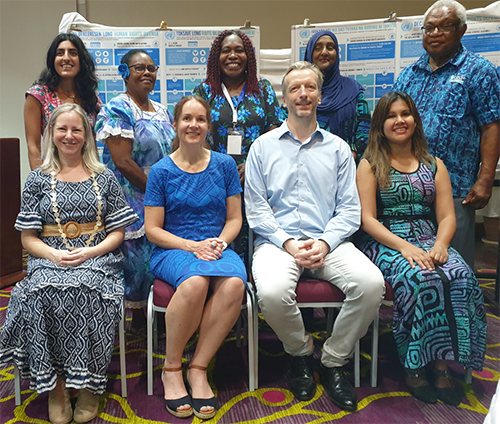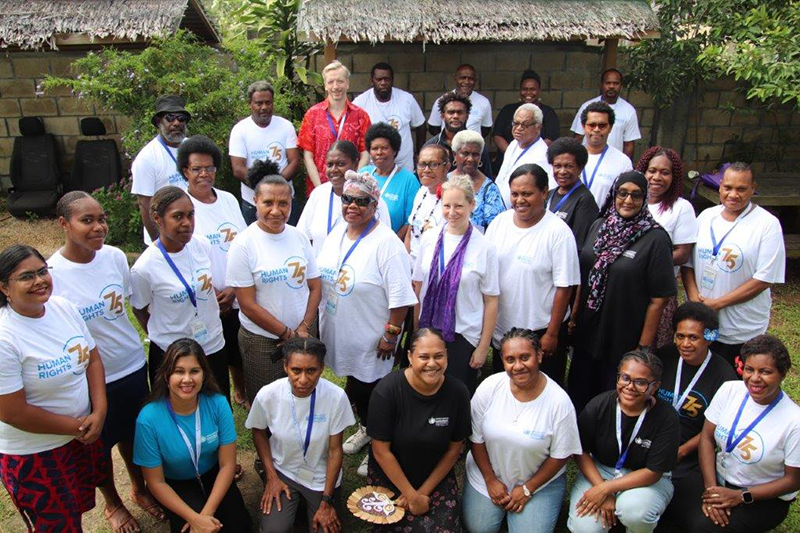
Translations of the UN Declaration on Human Rights Defenders into 3 Pacific languages – Bislama, iTaukei, and Tok Pisin – were launched in Port Vila, Vanuatu on 21 February, following a partnership between the The University of Queensland’s Asia Pacific Centre for the Responsibility to Protect (APR2P) and the United Nations Office of the High Commissioner for Human Rights, Pacific Regional office (OHCHR).
The launch was held alongside a three-day workshop, facilitated by the Pacific Human Rights Defenders Network (PHRDN) in partnership with the OHCHR and APR2P Centre and supported by the Swiss Embassy in Canberra, and which brought together 25 Vanuatu and 3 Papua New Guinea Human Rights Defenders.
The objective of the workshop was to address the critical need for protection mechanisms for Human Rights Defenders (HRDs) across the Pacific region, and to explore the role of HRDs in atrocity prevention efforts.
Despite some existing national legislation that can protect HRDs, the Pacific region lacks a robust and efficient protection strategy. Many Pacific Island countries face challenges such as inadequate judicial systems and underfunded or ineffective legal mechanisms for HRD protection.
To increase the accessibility of the UN Declaration on Human Rights Defenders, posters designed in line with local cultures and values were produced in Pacific languages. These were unveiled by Deputy Australian High Commissioner to Vanuatu Ms Emily Fisher and Special Envoy of Switzerland for the Pacific Region Mr Emmanuel Bichet.
Ms Fisher said Australia is developing Human Rights Defender Guidelines, consistent with the principles and approach of the UN Declaration, to better support and advocate for the work of human rights defenders in the region.
“The Australian Government is a strong advocate for R2P and the obligations it encompasses for states to protect the human rights of their populations,” she said.
“Climate change is the greatest threat to the region’s security, and Australia’s support for collective action on global challenges, including by partnering to promote a diverse and dynamic civil society, is vital to universal human rights, the rule of law and sustainable development.”
Ms Heike Alefsen, Regional Representative of the OHCHR said they were excited to launch the translations of as a better way to communicate the articles and meaning to the people of the Pacific.
“We believe that international instruments should be understood and easily be accessible by all. This is the first time we have translated this Declaration in Itaukei, Bislama and Tok Pisin and we hope it will add value to the defenders of human rights in Fiji, Vanuatu and Papua New Guinea,” she said.
The Asia Pacific Centre for the Responsibility to Protect supported the translation of the documents, which were completed by local translators in each country, as part of its commitment to making human rights and atrocity prevention materials more easily accessible to people from all backgrounds.
The Centre’s Atrocity Prevention Coordinator Nikki Marczak said human rights defenders are often at the forefront of atrocity prevention efforts, in terms of monitoring and recording human rights violations, escalations in risk factors and early warning signs of increased community tensions or violence.
“The Centre is proud to partner with the OHCHR and PHRDN to support human rights defenders in their important work through the translation of key documents,” she said.

The workshop emphasised the pivotal role of a vibrant civil society in promoting and protecting human rights, fostering democratic governance, contributing to the prevention of atrocities, and achieving sustainable development, peace, and security.
The outcomes document from the workshop outlined medium- and long-term priorities, including the need for a regional protection strategy and national protection mechanisms.
It stressed the importance of support from human rights institutions and governing bodies, full participation of marginalized groups in developing protection strategies, and special consideration for women human rights defenders.
Launched in February 2008, the Asia-Pacific Centre for Responsibility to Protect (APR2P) is an enduring partnership between the Australian Government’s Department of Foreign Affairs and Trade (DFAT) and UQ and is located in the Faculty of Humanities, Arts and Social Sciences School of Political Science and International Studies (POLSIS). It has helped achieve significant progress in developing the region’s normative consensus on R2P and in building partnerships and communities of practice across the region.



